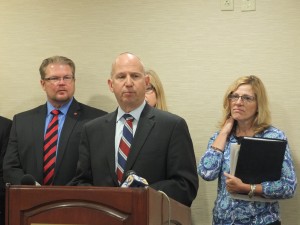Dover, DE – Joined by the State’s top health officials, along with infectious disease and emergency response experts, Governor Markell today provided an update on ongoing statewide efforts in response to the Ebola virus epidemic.
“We are facing an unprecedented situation with the Ebola virus, making prevention and preparation efforts vital,” said Governor Markell. “While the risk of transmission in Delaware is low, the State has been preparing for the potential of any Ebola cases for months to ensure we are in the best possible position to keep the public safe.”
While there are no cases in Delaware and the risk of transmission is low, the Division of Public Health (DPH) in the Department of Health and Social Services (DHSS) is working to ensure the appropriate screening tools and disease prevention strategies are used to further reduce any chance of transmission. These tools and strategies are based on the best currently available science, which tells us that Ebola virus is only transmitted by infected patients who have symptoms. The risk of getting the disease through normal, everyday contact is extremely low.
DPH is working closely with hospitals, medical providers, EMS companies, and many other partners to prepare, coordinate care, and provide advice and guidance. Issues being addressed by this group include how to screen for the disease, safe ambulance transportation of potential Ebola patients, personal protective equipment guidance and availability, hospital readiness, infectious disease monitoring, and protocols for any doctor’s office that might see a case.
“Delaware’s hospitals know that the best way to address Ebola is to prevent its spread. The Division’s approach to doing that is sound, science-based, and will help protect both Delawareans and the health care professionals who care for them,” said Wayne Smith, President and CEO of the Delaware Healthcare Association.
In addition, the Governor has directed engagement from all cabinet-level agencies to ensure statewide efforts are coordinated and comprehensive.
“If a case is confirmed in Delaware, a Centers for Disease Control and Prevention rapid response team would be on the ground to assist us,” said Secretary Rita Landgraf. “They would support the Division of Public Health to trace any potential contacts who might need to be monitored, have activity restrictions or, although unlikely, be quarantined. The CDC also would work with the State and the hospitals to determine if the ill patient should be moved out of state for treatment.”
In coordination with the Centers for Disease Control (CDC), DPH is receiving notice of all travelers from the three West African countries, Sierra Leone, Guinea, and Liberia.
DPH is in daily contact with those persons to check their status and health, and will remain in daily contact throughout the 21-day period following their last potential Ebola exposure. If anyone shows symptoms of illness or a fever, they will be taken to the closest hospital for evaluation, and, if needed, isolation and testing. Currently there are 11 individuals in Delaware who are considered low risk that are being monitored. Eight live in New Castle County and three live in Kent County. “Low risk” is defined as having no known direct contact with a person infected with the Ebola virus.
Delaware is also designating “high risk” and “some risk” categories for those who have had direct contact with a person or people symptomatic with the Ebola virus. (See attached) These individuals will receive direct active monitoring for the 21-day incubation period by Division of Public Health staff, including daily visits. “High risk” individuals must also be quarantined at home and “some risk” individuals must limit their activities, including avoiding public transportation and large gatherings, and seeking approval from DPH to travel.
DHSS urges people not to make assumptions that someone might be infected based on their accent, background or skin color, and it is important to remember how hard the disease is to transmit.
If you wish to discuss a suspected case, you may contact DPH 24/7 at 888-295-5156, including weekends and holidays. If you have general questions, the CDC has a 24/7 line available for information on the Ebola virus at 800-CDC-INFO (800-232-4636).
Photos from Ebola Briefing
Video from Ebola Briefing
Ebola Monitoring Fact Sheet
For further Ebola information and resources visit the Delaware Public Health homepage.
A person who is deaf, hard-of-hearing, deaf-blind, or speech-disabled can call the DPH phone number above by using TTY services. Dial 7-1-1 or 800-232-5460 to type your conversation to a relay operator, who reads your conversation to a hearing person at DPH. The relay operator types the hearing person’s spoken words back to the TTY user. To learn more about TTY availability in Delaware, visit here.
Delaware Health and Social Services is committed to improving the quality of the lives of Delaware’s citizens by promoting health and well-being, fostering self-sufficiency, and protecting vulnerable populations. DPH, a division of DHSS, urges Delawareans to make healthier choices with the 5-2-1 Almost None campaign: eat 5 or more fruits and vegetables each day, have no more than 2 hours of recreational screen time each day (includes TV, computer, gaming), get 1 or more hours of physical activity each day, drink almost no sugary beverages.
# # #


